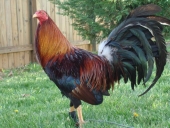








Best luck: satisfaction
Greatest curse, greed








Best luck: satisfaction
Greatest curse, greed












Nina Wright wrote:I raised chickens - hens - for 30+ years. After I recent move, I chose muscovy ducks (with a couple of Khaki Campbell hens for extra security that there will be enough eggs). Of the two Khaki hens, one is noisy sometimes. I am glad she is the only noisy one.
Pros;
- Muscovies are VERY quiet. Sometimes, if very upset (time to catch them to trim their wings) a hen will sound as loud as a quiet waterduck. Drakes hiss/whisper
- Duck drakes don't crow at all hours!!
- They aren't quite as hard on the garden as chickens
- I have terrible squash bug populations - this year I will plant the squash where I can run the ducks and we will test that out
- ducks live longer, have longer high-egg-production lives than chickens
- muscovies make good mothers (I hope this batch was the last time I ever brood newly hatched birds myself!)
- duck manure is not hot. While for human health reasons you are still supposed to compost it 6 months before putting on vegie garden, if some gets in there it won't kill my plants (yes, story to tell there of applying what I THOUGHT was well-composted chicken manure...)
- muscovies are climbing wood ducks, so have nasty back claws (like fighting roosters) which can help fight off hawk and dogs
- muscovies are larger, which also helps against predators
- muscovies are larger, which means the breast meat is SO good! More like beef.
- muscovies are good foragers
- I have read that muscovies don't need water to mate, but some water-duck breeds do. So they don't demand a pond.
- ducks are much less light sensitive, so more year-round laying than chickens
Cons:
- must have at least four hens per libidinous drake. And I want two drakes in case something happens to one, so that means minimum of 10 ducks
- duck house needs are more demanding than for chicken housing - need more space (they are active during the night) and the bedding gets wetter, needs changing more often.
- waterer needs to be cleaned out more often since they rinse out their foody beaks there. I pour out the buckets onto my veggies
- must be able to dip whole head into water
- some websites say they need to be able to bathe to trigger proper oil secretion for their feathers - mine have a pan they can get in up to the tops of their legs and hunker down in to bathe




 1
1












H Hardenberg wrote:
If you have any tips on roosters that do not crow at ridiculously early hours (like 5 AM), that would be much appreciated!

|
I'm a lumberjack and I'm okay, I sleep all night and work all day. Lumberjack ad:
Learn Permaculture through a little hard work
https://wheaton-labs.com/bootcamp
|






